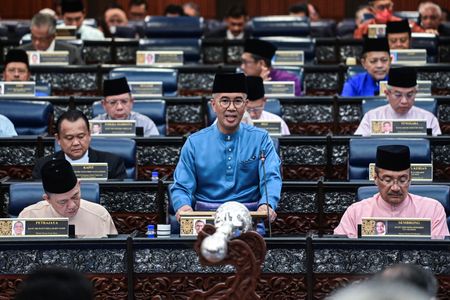By Rozanna Latiff and Mei Mei Chu
KUALA LUMPUR (Reuters) -Malaysia on Friday unveiled a smaller budget for 2023 and warned of an economic slowdown but, with a possible national election in the offing, also announced cash aid and tax cuts.
Prime Minister Ismail Sabri Yaakob’s administration had been expected to present a moderately expansionary budget and offer incentives for voters after he raised the prospect of an early election that would be held this year.
But the drop in planned spending for 2023, including proposed reduced subsidies, underscores the fiscal pressure faced by Malaysia this year amid declining revenue and record-high subsidy costs.
In economic and fiscal outlook reports released ahead of the finance minister’s budget speech in parliament, the government said it was taking a cautious approach to a “challenging” 2023 due to political tensions, rising global inflation, tightening financial conditions, and supply chain disruptions.
“The 2023 budget aims to provide favourable conditions and ensure a balance between economic needs and fiscal consolidation,” Finance Minister Tengku Zafrul Aziz said in the fiscal outlook report.
Malaysia will develop appropriate policies to address any external shocks, he said.
In the two reports, the government revised up its 2022 gross domestic product (GDP) forecast to 6.5%-7% from a previous range of 5.3% to 6.3%, but expected growth to slow next year to 4%-5%.
Strong domestic demand, new and ongoing infrastructure projects, and a vibrant services sector will offset some of the risks from the global slowdown, it said.
The government plans to spend 372.3 billion ringgit ($80.08 billion) in 2023, down from an estimated 385.3 billion ringgit this year, according to the reports.
Revenue was seen declining 4.4% to 272.6 billion ringgit in 2023, while the fiscal deficit will likely narrow to 5.5% of GDP from a projected 5.8% this year, the reports said.
In his budget speech in parliament, Zafrul said the government will allocate 10.3 billion ringgit ($2.22 billion) in cash and welfare aid to low-income households. He also said income tax rates will fall by 2 percentage points.
The government also vowed to consolidate the country’s fiscal position by embarking on a review of public expenditure and a plan to reduce broad subsidy measures to one targeted towards vulnerable groups.
It expects to spend 42 billion ringgit for subsidies and social assistance next year, lower than this year’s record 77.7 billion ringgit.
“This is in line with the government’s commitment to maintain fiscal prudence and discipline in order to ensure fiscal sustainability in the long term,” the government said in its reports.
Economists at Barclays Research said that if an election is held soon there may not be enough time for parliament to approve the budget, which could delay the government’s fiscal consolidation plans.
“In addition, the prospect of an early election should keep the government’s focus on supporting growth and capping prices, skewing fiscal risks higher,” the economists said in a note.
“These dynamics imply risks of higher rates, steeper curves and a weaker (ringgit), especially given an unsupportive global backdrop.”
($1 = 4.6500 ringgit)
(Reporting by Rozanna Latiff, Mei Mei Chu and A. AnanthalakshmiEditing by Ana Nicolaci da Costa and Frances Kerry)





